
Summary : St John XXIII, pope, Angelo Giuseppe Roncalli (1881-1963), born in Sotto il Monte in Lombardy, was ordained priest in 1904 and served (among other places) as nuncio in France, before becoming Patriarch of Venice. He served as pope from 1958 to 1963 and in his final year issued an urgent call for international peace with his encyclical “Pacem in Terris”(1963). He surprised many by calling for the Second Vatican Council (1962-1965) but did not live to see it to completion.
Angelo Giuseppe Roncalli was Patriarch of Venice when on 28th October 1958, he was unexpectedly elected pope in succession to Pius XII. He was 77 years of age. Over the next four and a half years he succeeded in updating (Italian aggiornamento) the Catholic Church through the Second Vatican Council (1962-65).
A down-to-earth friendly man with a good sense of humour, he won over many who were previously antagonistic to Catholicism. However, not all his colleagues in the Roman Curia saw eye-to-eye with his projects.
Patrick Duffy outlines his life.
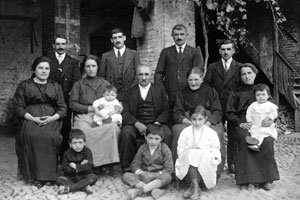
The Roncalli Family
Family Background
Angelo was born in the small country village of Sotto il Monte just west of the city of Bergamo in the Lombardy region of Italy. He was the first boy in a family of thirteen. He had six sisters and six brothers. They were the largest family in the village. His family worked as sharecroppers, that is, working the land but giving a share of the produce to the land owners.
Family and Youth
Angelo recalled seventy-six years later how his mother Marianna, now pregnant with her sixth child brought her previous five to a local shrine of the Madonna for Mass on the feast of the Presentation of Mary in the Temple. As Mass had started and they couldn’t get inside, she lifted Angelo so he could see inside: “Look, Angelino,” she said, “See how beautiful the Madonna is. I have consecrated you wholly to her.” This was the first clear memory he had of his childhood.
Angelo’s memory of his father Giovanni is of a good man always working: “My father is a peasant who spends his days digging and hoeing, among other things, and I far, from being better than my father, am much worse, for my father is at least simple and good, while I am full of malice”. This was written in his Journal in 1902 during a retreat at the Roman Seminary.
His granduncle who had no family of his own was godfather to Angelo and a guiding spirit to the whole extended family. He was a reading man, read the Bolletino Salesiano published by Don Bosco and was involved in the Salesian apostolate. He cut a picture of Our Lady out of the bolletino and place it above Angelo’s bed.
At school, Angelo was bright. Once a visiting inspector asked the class: “Which is heavier – a quintal of straw or a quintal of iron?” The class answered, “A quintal of iron”. Only Angelo said they weighed the same. He served Mass in the local church every day. And when he received his first communion at the age of eight, the parish priest, Fr Francesco Rebuzzini, chose Angelo to write out the list of the names of his companions.
Seminary at Bergamo
Angelo could never remember a time when he didn’t want to be a priest. The first person he told about it was his cousin Camilla. One of the family of the land owners whose land the family worked was a priest Don Giovanni Morlani. He along with the parish priest paid for Angelo’s fees when he went as a boarder to the seminary at Bergamo. Fr Francesco noted he had a taste for study
In November 1893, just before his twelfth birthday, with financial help of Don Giovani Morlani and his parish priest he went as a boarder to the junior seminary at Bergamo.
Two years later on the advice of his spiritual director, Canon Luigi Isacchi (1839-98) he began to write down his moments of grace or spiritual insights, and to maintain a critical eye on his faults and failings. He used it to build his character so he’d become a good priest. It was published after his death with the help of his secretary Don Loris Capovilla as The Journal of a Soul.
In September 1895 Angelo visited Milan for the National Eucharistic Congress and came to know such figures of the wider Church such Cardinal Andrea Ferrari, archbishop of Milan (1894-1921) and Giuseppe Sarto, patriarch of Venice and later Pope Pius X (1903-14). He experienced some of the crises of growing up – difficulties of communication with his mother and a feeling of being orphaned following the death of his friend and parish priest Fr Francesco Rebuzzini. In the seminary he was given some posts of responsibility – made a prefect and given charge of Gregorian chant. In 1900 he made a visit to Rome and Assisi and later that year was awarded a scholarship to go to study theology in the Roman Seminary.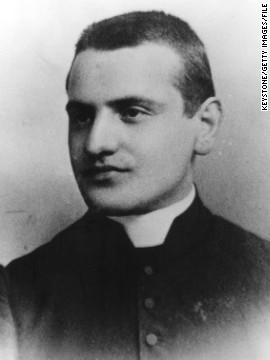
Angelo arrived there in early January 1901. He enjoyed the culture of the city was happy in the progress of his studies and was spiritually fulfilled, even if most of his clerical clothes were second hand. In November that year he began a year of military service. The barrack-room boasting of sexual exploits was a great shock to his sensibilities and he came to realise priests were not immune to temptation. When he returned to the Seminary after a year he was aware of how God had cared for him with a mother’s tender love (Journal, 91).
Ordination: a new Pontificate and Diocesan Secretary
In August 1903 Angelo was in St Peter’s Square when white smoke signalling the election of Pope Pius X brought an end to the twenty-five year of the comparatively open pontificate of Leo XIII. Angelo felt the tensions, but was also taken up with the preparations for his ordination which took place on 10th August 1904. His family were not there but he returned home to say Mass in his home church on 15th August. He began canon law studies later that year, but a new situation arose when Pope Pius dissolved the socially aware movement Opera dei Congressi and appointed its chaplain Giacomo Radini-Tedeschi as bishop of Bergamo. He chose Angelo as his secretary and it was in the service of his bishop that he spent the next ten years of his life. He also lectured in church history at the diocesan seminary at Bergamo.
During this time also he was friendly also with the archbishop of Milan, Andrea Carlo Ferrari (beatified in 1987 by Pope John Paul II), whom he would visit at Milan. Here he came across historical papers of the diocese of Bergamo and of the reforms of St Charles Borromeo in the years after the Council. This topic fascinated him as a church historian and he wrote about it in his later years when he was nuncio in Turkey and Greece.
World War I and Following Years
In August 1914, World War I broke out and soon both Pope Pius X and Bishop Radini-Tadeschi died. In May 1915, Angelo was drafted into the army as a chaplain. He had sympathy for the young Italian men who like himself and his brothers were caught up in a war they did not understand.
After the war he became warden of a student hostel in Bergamo and chaplain to the Union of Catholic Women, but in 1919 he was reappointed to the seminary as spiritual director. He attracted the national eye when he spoke at the National Eucharist Congress and in 1921 was appointed as the Italian president of the Pontifical works (fund-raising body) of Propaganda Fide (the office for the missions). During this time he became friendly with Giovanni Battista Montini who had been a Vatican diplomat in Poland and now worked with the Secretariat of State. Both had reservations about the rise of Mussolini and fascism at that time and the eclipse of the ‘Partito Populare’ that favoured a Christian values.
Vatican Diplomat – Patriarch of Venice
In 1925 Pope Pius XI appointed Roncalli as Apostolic Visitor to Bulgaria (1925–1935), and he was ordained titular bishop of Areopolis, Greece. He chose as his episcopal motto ‘Obedientia et Pax’ (“Obedience and Peace”). In 1935 he was made Apostolic Delegate to Turkey and Greece. Roncalli used this office to help the Jewish underground in saving thousands of refugees in Europe, and he has been proposed to be a ‘Righteous Gentile‘ in the Holocaust Museum of Yad Vashem in Jerusalem. In 1944, when he was sixty-four, Pope Pius XII named him Apostolic Nuncio to France where he worked to heal the divisions caused by the German occupation during World War II.
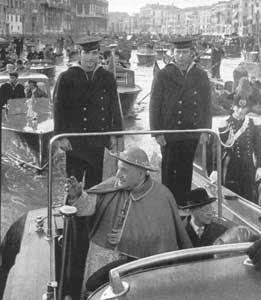 In 1953, when the Patriarch of Venice Carlo Agostini died of Parkinson’s disease, Roncalli (now seventy-two) was appointed to succeed him. In Venice he quickly won the affection of the people by his visiting parishes, care for the working classes and
In 1953, when the Patriarch of Venice Carlo Agostini died of Parkinson’s disease, Roncalli (now seventy-two) was appointed to succeed him. In Venice he quickly won the affection of the people by his visiting parishes, care for the working classes and
developing forms of social action.
A New Kind of Pope
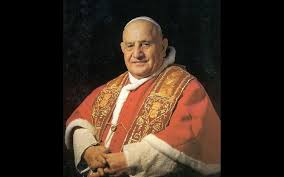 On 28th October 1958 on the eleventh ballot, ‘against all expectations‘, Roncalli was elected pope and took the name John. It was, he said, his father’s name and the name of the parish church where he had been baptised and many other churches throughout the world.
On 28th October 1958 on the eleventh ballot, ‘against all expectations‘, Roncalli was elected pope and took the name John. It was, he said, his father’s name and the name of the parish church where he had been baptised and many other churches throughout the world.
On the night of his election as pope, he was so happy he spoke to the crowd gathered in St Peter’s Square:
“Go home to your families and embrace and kiss your children from the Pope for this has indeed been a joyful day”.
He quickly brought a new energy into play – calling the first diocesan synod of Rome, the revision of the code of canon Law and the Second Vatican Council. The story is that, when it was announced that Protestant leaders would be invited to the council as observers, the conservative Cardinal Ottaviani was horrified, exclaiming: “But Your Holiness, Protestants are heretics!”
Pope John corrected him”Do not say, ‘heretics‘, my son. Say, ‘separated brethren‘“.
“They are in league with the devil!” “Do not say, ‘devil‘, my son. John replied Say, ‘separated angel’.”
He was commonly referred to as Good Pope John. When he began walking around the city of Rome and was given the nickname ‘Johnny Walker‘, a pun on a whiskey brand name! He also made pastoral visits to hospitals and prisons, to universal astonishment.
In September 1962, he was diagnosed with stomach cancer, but was still strong enough to be able to see through to the opening of the Second Vatican Council. Above all else it was to be a Pastoral Council. No condemnations or anathemas were to be made; political hostilities were to be ignored; and the church above all was to recognize that it was not the master but the servant of humanity.
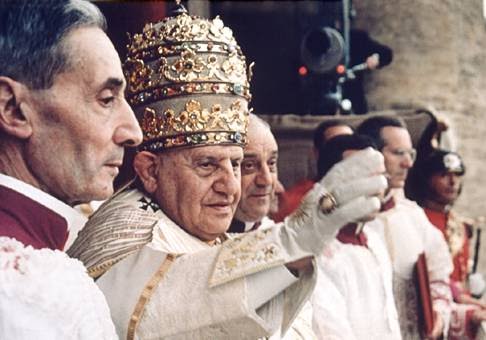 Opening of the Council
Opening of the Council
In his speech on the day of the opening of the council (11th October 1962), John stressed the “opportuneness“ of the Council. He wanted it to strike a joyful note, and took issue with those whom he called “prophets of doom“:
“In the daily exercise of our pastoral office, we sometimes have to listen, much to our regret, to voices of persons who, though burning with zeal, are not endowed with too much sense of discretion or measure. In these modern times they can see nothing but prevarication and ruin. They say that our era, in comparison with past eras, is getting worse, and they behave as though they had learned nothing from history, which is, none the less, the teacher of life. They behave as though at the time of former Councils everything was a full triumph for the Christian idea and life and for proper religious liberty. We feel we must disagree with those prophets of gloom, who are always forecasting disaster, as though the end of the world were at hand.
He wanted the Council to promote Christian truth, to proclaim and seek joyfully the kingdom of God, to which all other things would be added.
His passion for equality is summed up in his famous statement,
“We were all made in God’s image, and we are all Godly alike.”
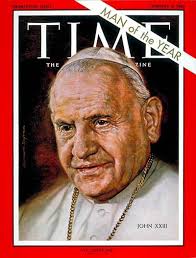
Outreach was to be done in a pastoral way:
“The substance of the ancient doctrine of the deposit of faith is one thing, and the way in which it is presented is another. And it is the latter that must be taken into great consideration with patience if necessary, everything being measured in the forms and proportions of a magisterium which is predominantly pastoral in character.”
He wanted the Church
“to use the medicine of mercy rather than that of severity”.
He said people were “deeply convinced of the paramount dignity of the human person“.
The goal of the Council, he concluded , should be “to promote the unity of the Christian and the human family”.
Good Pope John died eight months later on June 3, 1963 with peritonitis caused by a perforated stomach. Before he died he said: “Born poor, but of humble and respected folk, I am particularly happy to die poor, having distributed, according to the various needs and circumstances of my simple and modest life in the service of the poor and of the holy Church whatever came into my hands. In his last will he bequeathed each of the living members of the family a legacy of less than $20—his total personal fortune.
A leading cardinal present when the coffin of Pope John XXIII was re-opened after 38 years today said the pontiff looked as if he had “only died yesterday.” “None of the body had decomposed,”
He was canonised by Pope Francis on 27 April 2014
____________________________________
******************************
Memorable Saying for Today
Consult not your fears but your hopes and dreams.
Think not about your frustrations, but about your unfulfilled potential.
Concern yourself not with what you tried and failed in,
but with what is still possible for you to do.
~ Good Pope John XXIII ~
******************************